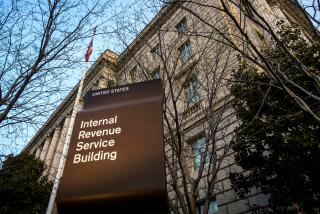Inflation Puts ‘the Lion’ on Hold : Brazilians Get More Time to Pay Taxes
- Share via
RIO DE JANEIRO — The Lion will not bite today.
Brazil’s income tax agency, nicknamed the Lion, is giving taxpayers a break: Tonight’s deadline for paying the first installment on individual tax bills has been postponed for 15 days.
The relief, though temporary, is welcome. The never-popular tax season coincides this year with rampant inflation, and protests over both have become a major headache for President Jose Sarney’s two-year-old government.
By official reckoning, the inflation rate was 16.8% in January and 13.9% in February. Finance Minister Dilson Funaro said this week that the figure for March will fall between 14.2% and l4.4%.
Compounded, that means prices have risen at least 51.9% in three months. Wages are being adjusted, but labor unions complain that the raises do not keep pace with the rising cost of living.
Funaro admitted to reporters Monday that inflation “is very high and heavy.” He blamed it on readjustments of prices, which were frozen by the government for most of 1986.
Until the government began allowing prices to be raised last November, inflation was running at less than 2% a month.
“We are sorry that some prices went up more than they should have,” Funaro said. “As a citizen, I am revolted by some prices.”
He said that the recent rate of increase may indicate that the economy is entering “inertial inflation,” a spiral of price increases fueled by its own momentum.
If so, he said, “I don’t know what we are going to do.”
Funaro returned Monday from a trip to the Washington, D.C., where he met with representatives of international lending agencies to discuss his country’s economic problems. The talks were triggered by Brazil’s suspension in February of interest payments on its debts to private foreign banks.
Wants New Terms
Brazil wants to renegotiate the loans for extended terms and lower interest rates, and the country’s creditors wanted to know what Brazil will do to control inflation and put its finances on a sound footing.
Many economists say that the inflation is fed by deficit financing of government budgets. One way to reduce these deficits would be to raise more money through taxes.
Funaro promised last year that taxes on individuals would not be increased, but experts say that complicated tax formulas and inflation have combined to drive up tax bills for many.
When returns were filed last year, 835,000 Brazilians owed the government more than what had been withheld from their paychecks. This year, officials estimate that 3.5 million taxpayers will have to pay. Moreover, taxpayers who had refunds coming for last year still have not received their checks.
Complaints about the tax system have mushroomed into a movement that the press is calling a revolt. A Sao Paulo newspaper, Jornal da Tarde, has conducted a campaign urging Brazilians to “Say No to the Lion.” The newspaper collected 58,000 signatures on a petition that was delivered last week to congressional leaders.
The protest has the support of many congressmen of the governing Brazilian Democratic Movement Party. One of them, Gustavo Faria, predicted this week that many Brazilians will refuse to pay their taxes.
As a concession to the protesters, the government last month postponed the tax filing deadline from April 1 to April 15, and stretched from six to eight the number of monthly installments allowed on taxes due.
Funaro announced Monday that although returns are still due tonight, the deadline for paying the first installment will be extended until April 30. He said the extension, and the fact that the installment will not be readjusted for inflation, are “in fact a very big tax reduction.”
Brazilian income taxes hit hard at the middle class but spare those who make up the majority of the work force. Monthly salaries up to $290--five times the officially established minimum salary--are exempt from taxation.
More to Read
Sign up for Essential California
The most important California stories and recommendations in your inbox every morning.
You may occasionally receive promotional content from the Los Angeles Times.










